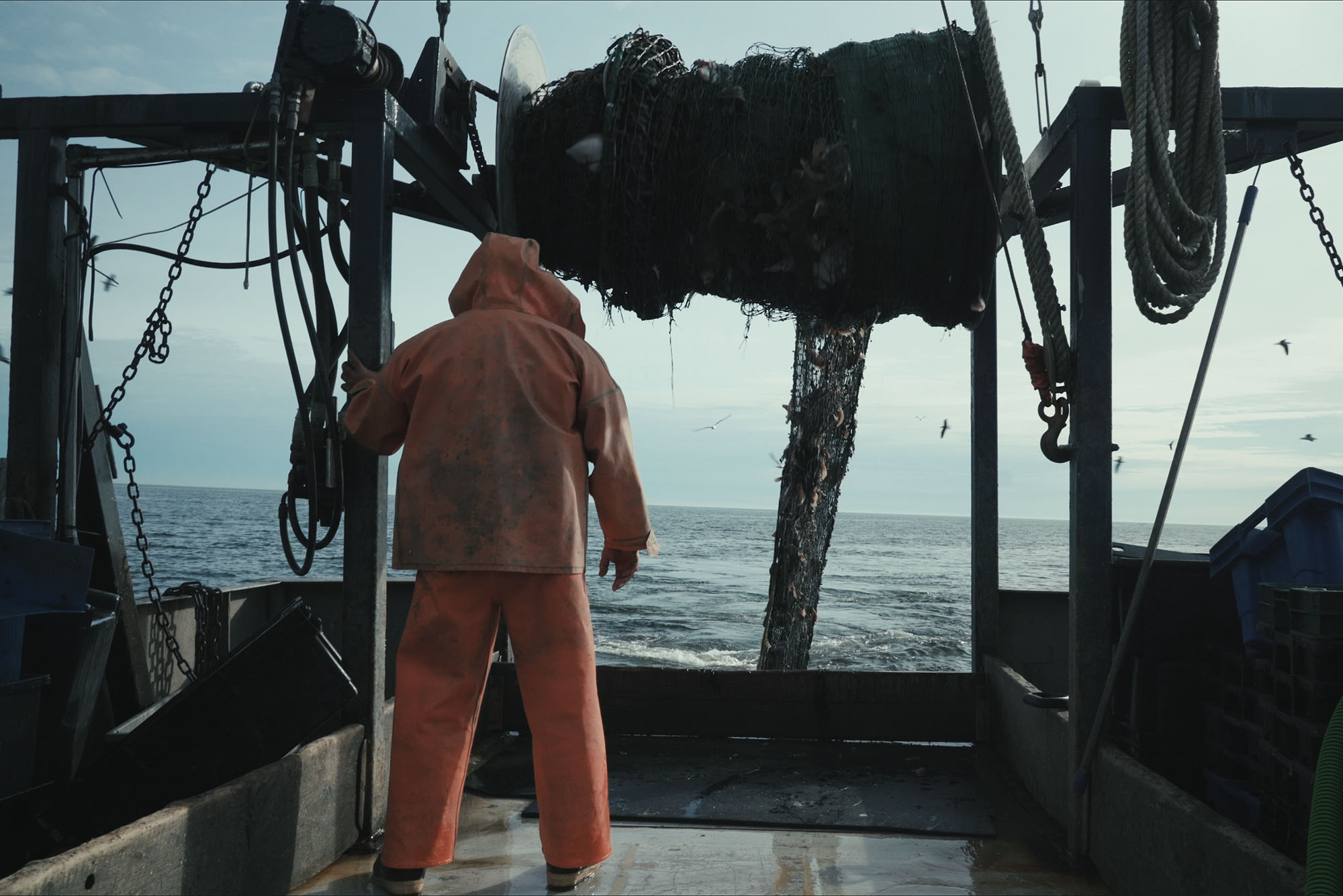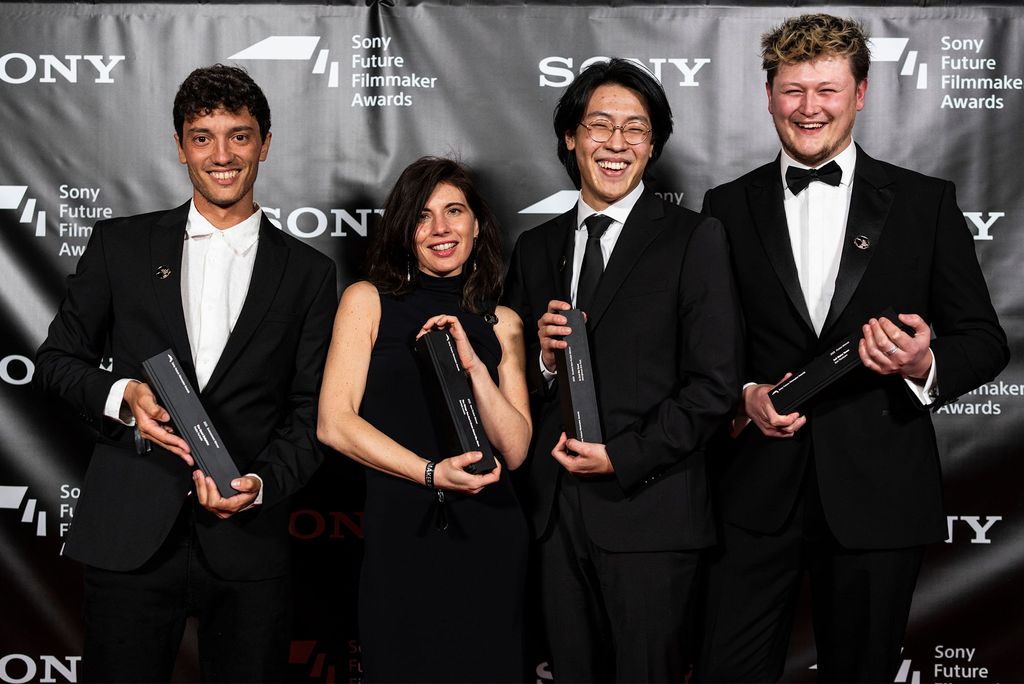Two COM Film & Television Students Win Inaugural Sony Future Filmmaker Award

In Cod We Trust explores the current state of the Gloucester fishing industry, which is one of the oldest and largest in the United States. Photo courtesy of Seonghoon Eric Park
Two COM Film & Television Students Win Inaugural Sony Future Filmmaker Award
Documentary In Cod We Trust explores the Gloucester fishing industry’s history and hardships
“We won.” That was the text message Seonghoon Eric Park (COM’23) hastily fired off to his filmmaking partner Raphaël Edwards (COM’23)—who was back in Boston—letting him know that their careers had just taken off.
Park was the team’s in-person representative at the inaugural Sony Future Filmmaker Awards, held in February at the Sony Pictures Studio lot in Culver City, Calif. The two film and television students won the Student Filmmaker Non-Fiction category for their documentary In Cod We Trust, which explores the hardships of the Gloucester fishing industry, which has been active since the 1600s. Their film was one of five shortlisted in its category and one of more than 4,000 global submissions.
“I was in shock. I couldn’t believe it,” says Park, remembering the night they won and his two-word text to Edwards. “I didn’t want to be rude messaging the whole time, so I had to keep it short.” Only one representative from each film could be present, but the two friends will share an array of Sony camera equipment they were awarded as a prize.
Park and Edwards originally created In Cod We Trust in spring 2022 as their final project in the College of Communication class, FT 544: Documentary Production, taught by Tatyana Bronstein, a COM lecturer of film and television. While the pair set out to create a general documentary about how the pandemic was affecting the New England fishing industry, they narrowed their focus after doing their first few interviews. The film evolved to focus exclusively on Gloucester and the environmental and social issues that threaten the city’s historic fishing practice. As one of the oldest and largest fishing communities in the United States, generations of fishermen have caught cod and other species off Gloucester’s shores. But with increased government regulations, rising ocean temperatures, and few aspiring fishermen, the future of the industry is uncertain.
The documentary was filmed over several days in April 2022, with Park and Edwards sometimes shooting 12 hours per day and supplementing their hand-shot footage with drone work. They recalled meeting a fisherman at 3 am and spending several hours filming on his boat. Since the boat’s surface was wet and slippery, the two had to minimize their equipment and film everything by hand, since a tripod would not balance or produce stable footage.
“One thing we noticed is these fishermen spend 12 hours a day on the water alone. They are very stoic and don’t talk just to talk,” Edwards says. “We had to probe them with a lot of questions, but they clearly had a message: the struggles they’re having with the government restricting how much fish they can catch, which in turn restricts how much money they can make, which in turn restricts how many people go into fishing.”


Seonghoon Eric Park and Raphaël Edwards film scenes for In Cod We Trust. Photos courtesy of Seonghoon Eric Park
Park and Edwards say their biggest challenge was creating a cohesive and balanced story. They spoke with fishermen struggling due to government fishing quotas, but they knew they needed to hear from those creating the regulations. They interviewed members of the scientific community, who are fighting for stricter environmental laws and safer fishing practices.
During one of their interviews, Park and Edwards learned an old phrase that used to be spoken in Gloucester: “In cod we trust, because here, cod is king.” They realized it was the perfect, punny title for their film, given how plentiful cod used to be in the waters.
After considering which festival to submit their documentary to, the pair decided to take a chance and enter the Sony Future Filmmaker Awards competition. Once In Cod We Trust was shortlisted, Park traveled to Los Angeles for the three-day event at the Sony Pictures Studio lot, which included a red-carpet awards ceremony and a two-day workshop. The winners of each category were announced during the awards ceremony.
“Just like our esteemed panel of judges, I was impressed by In Cod We Trust’s narrative force,” says Scott Gray, founder and CEO of Creo, the company who organized the event. Adds judge Nicole Brown, president of TriStar Pictures, “I was so impressed by the breadth and diversity of the submissions from such an incredibly talented generation of new filmmakers. The amount of passion and creativity was astounding and made the task of narrowing it down no small feat.”
Park and Edwards are currently planning a screening and Q&A event for In Cod We Trust in Gloucester this summer and are waiting to hear back from other festivals. The documentary was recently featured at the Salem Film Fest, where it won second place for best picture, and at last month’s annual BU Redstone Film Festival, where it tied for best editing and tied in third place for best picture.

Park graduated in January 2023 and Edwards will graduate this month. The two are working on a series of freelance projects and say they are open to creating more documentaries in the future. “I don’t think I ever thought of myself as a documentary filmmaker,” says Edwards. “But COM FT 544 is a great class. It’s really about what you put into it.” Park agreed, adding, “[Documentary production] is so much like narrative filmmaking. You need to have strong characters and a whole story structure. It’s more interesting because we get to work with real-life, unexpected events.”
Comments & Discussion
Boston University moderates comments to facilitate an informed, substantive, civil conversation. Abusive, profane, self-promotional, misleading, incoherent or off-topic comments will be rejected. Moderators are staffed during regular business hours (EST) and can only accept comments written in English. Statistics or facts must include a citation or a link to the citation.